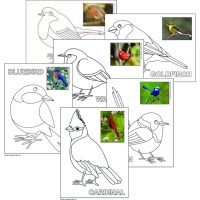Outdoor Skills Patch Group – Patch Program®
6″ wide group of twelve 2″ iron-on embroidered patch. Includes:
- Camping skills patch
- Fire Building
- Ropes and Knot Tying
- Rolling and Packing
- Outdoor Cooking
- Tent Pitching
- Hiking skills patch
- First Aid
- Leave No Trace
- Compass and Map Reading
- Wildlife Watching
- Identifying Nature

 Suggestions for how younger children can earn the Fire Building Patch:
Suggestions for how younger children can earn the Fire Building Patch:
- Download and read this story about Smokey the bear and how to prevent forest fires.
- Make the puppets in the download or make the booklet. Share what you have learned with your family.
- Learn how to pick a campfire spot and what you will need. Download and complete the maze from your order confirmation.
- Optional project: Make fire starters.
- Help gather wood. Things to remember:
Make sure to stay in the designated area.
Stay with a buddy.
Only gather dry wood. - Separate your wood into 3 piles:
Tinder: Small twigs and dry leaves, grass and needles.
Kindling: Sticks smaller than 1″ around.
Fuel: Larger pieces of wood. Keep these stacked upwind, away from the fire. - Help to arrange the wood.
- Learn what to do if the campfire gets out of control. Who would you call?
- Learn how to extinguish a campfire.
Before you leave:
- Make sure campfire is completely extinguished.
- Double check that you are not leaving anything behind including your trash.
Suggestions for how older children can earn the Fire Building Patch:
- Download the Camp Fire Safety Crossword from your order confirmation and review your knowledge of “Dos and Don’ts”
- Learn about forest fire prevention.
- Find out about careers in firefighting.
- Explore ways to start a fire without matches or a lighter.
- Optional project: Make fire starters.
- Optional project: Do a Mad-Lib
When you go camping:
- Demonstrate that you know how to safely handle matches and a lighter.
- Attempt to start a fire without matches or a lighter.
- Take a turn with helping to extinguish a campfire.
Before you leave:
- Make sure campfire is completely extinguished.
- Double check that you are not leaving anything behind including your trash.
Knot tying can be decorative like macrame or friendship bracelets but it can also be a lifesaving skill to develop. Inexpensive jump ropes tied to the back of a chair can be a good option for practicing your knot tying.
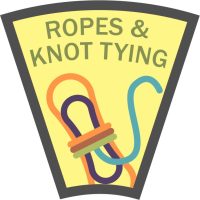 Suggestions for how younger kids can earn the Ropes & Knot Tying Patch:
Suggestions for how younger kids can earn the Ropes & Knot Tying Patch:
- Make a knot tying refernce guide. Print the downloads included with your purchase. There is an option for printing and cutting or printing on Avery Business card stock. Laminate the cards. Punch a hole in the corner of each card. String them on to a binder ring.
- Learn how to tie an overhand knot, a half knot and a square knot.
- Demonstrate that you can tie your shoes.
- Learn how to tie a bandana around
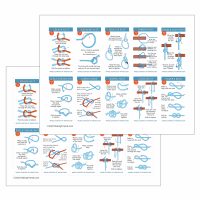 your head to keep your hair secure around fire.
your head to keep your hair secure around fire.
Suggestions for how kids can earn the Ropes & Knot Tying Patch:
- Make a knot tying refernce guide. Print the downloads included with your purchase. There is an option for printing and cutting or printing on Avery Business card stock. Laminate the cards. Punch a hole in the corner of each card. String them on to a binder ring.
- Learn how to tie 10 knots.
- Learn how to coil rope and lash.
- Demonstrate that you can make a bushcraft tripod.
- Make something useful using lashing such as a camping chair or cooking tripod.
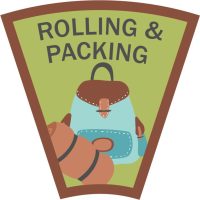 Suggestions for how younger children can earn the Rolling and Packing Patch
Suggestions for how younger children can earn the Rolling and Packing Patch
Before you go camping:
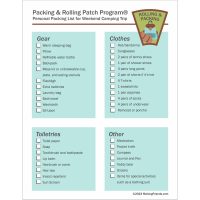 Watch this video to learn how to roll a sleeping bag.
Watch this video to learn how to roll a sleeping bag.- Practice rolling your sleeping bag.
- Demonstrate you can roll your sleeping bag by yourself.
- Download our Personal Packing List from your order confirmation and review it with your troop and at home. Make sure you will have everything you need before you pack for camp. Learn how to pack your back pack. Watch this video for suggestions.
When you go camping:
- Keep track of your personal items and keep your personal area neat.
- Roll your sleeping bag when you get up in the morning without being asked.
Suggestions for how older children can earn the Rolling and Packing Patch:
Before you go camping:
 Download our Personal Packing List from your order confirmation and review it with your troop and at home. Make sure you will have everything you need before you pack for camp.
Download our Personal Packing List from your order confirmation and review it with your troop and at home. Make sure you will have everything you need before you pack for camp.- Download our Camp Kitchen Checklist from your order confirmation and review it with your troop. Find out which items will already be available to you at the campground. Mark them off. Find out which other items your troop has access to and mark them off. Make note of any necessary item you will need to aquire before camping.
- Respect all cooking gear and utensils by cleaning them and putting them away.
- Scout Rolling & Packing-Camping-PatchReturn any borrowed items in a resonable amount of time.
The most challenging part of camping with a group of kids is figuring out what to cook. Picky eaters, dietary restrictions and allergies can make it almost impossible to plan meals. We’ve put together recipes that are kid-friendly and can be easily customized for individual needs.
 Here are some recipes that are easy and can be prepped ahead of time. Many of these dishes use the same items to make them more cost effective and allow the kids to choose their own ingredients. It has been shown that children who help meal decisions and participate in the preperation are more likely to try new foods and make healthier choices.
Here are some recipes that are easy and can be prepped ahead of time. Many of these dishes use the same items to make them more cost effective and allow the kids to choose their own ingredients. It has been shown that children who help meal decisions and participate in the preperation are more likely to try new foods and make healthier choices.
Whenever possible, such as with tin foil meals, lay out all options and allow children to go down the line and make selection of protein, carbs and and vegetables.
Breakfast:
- Tin Foil Banana Boat with choice of fruit and nut toppings.
- Plastic Bag Omelette with choice of fillings and egg substitute
- Coconut French Toast with gluten-free vegan option.
- Yogurt Parfait with choice of fruit and granola.
- Breakfast Burritos with choice of protein and cheese.
Lunch:
- Tacos with my choice of fillings
- Hamburgers with vegan, gluten-free option
- Campfire Nachos with my choice of protein and toppings
- French Bread Pizza with my choice of toppings
- Loaded Potatoes with my choice of protein and vegetables
Dinner
- Hot Dogs on a stick with vegan, gluten-free option
- Sloppy Joes with vegan, gluten-free option
- Kabob with my choice of protein and vegetables
- Cheeseburger hobo packets with my choice of vegetables
- Camping Pasta with my choice of protein
Snacks
- Campfire Cinnamon Roll-ups
- S’more Nachos
- Apple Pie in a Can
- Campfire Peach Cobler
- Campfire Popcorn with my choice of seasoning
Suggestions for how younger children can earn the Outdoor Cooking Patch:
Before you go camping:
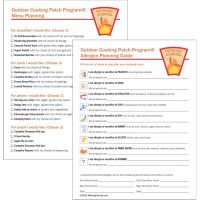 Print the first 2 pages of the download from your order confirmation. Campers should fill them out at home with a caregiver. One is for allergens and food sensitivity the other is menu choices and options.
Print the first 2 pages of the download from your order confirmation. Campers should fill them out at home with a caregiver. One is for allergens and food sensitivity the other is menu choices and options.- Learn about eating better at myplate.gov and crack the secret code.
- Help prep some food ahead of time.
When you go camping:
- Learn how to cook something on a stick over an open fire such as hot dogs.
- Make your own foil packet meals.
- Take a turn cooking on a grill.
- Use a dunk bag.
- Help with clean up.
Suggestions for how older children can earn the Outdoor Cooking Patch:
Download the worksheets from your order confirmation.
- Learn about food safety and test your knowledge with our crossword puzzle.
- Using worksheet, find out how to cook with different methods over a fire including what kind of equipment you need and if it will be available on your camping trip. With your troop, choose at least three methods to try on your camping trip:
- Cooking on a Stick
- Grill Grate over Fire
- Pie Irons
- Dutch Oven
- Rotissere
- Foil Packettes
- Cooking Tripod
- Sandwich Basket
3. With your group, choose the menu and make a shopping list. Download our worksheet or use your own. If possible participate in the shoppping.
4. Help prep food such as cutting vegetables and partitioning and wrapping for meals.
When you go camping:
- Participate in cooking with at least 3 different methods chosen before your trip.
- Check for food safety issues regularly.
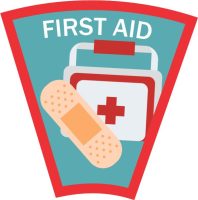 Suggestions for how younger kids can earn the First Aid Patch.
Suggestions for how younger kids can earn the First Aid Patch.
Before you go hiking:
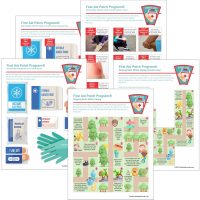 Download and print the maze worksheets about hiking safety from your order confirmation. Cut out the nine squares. Arrange them in order 1-9 making sure the path is safe and clear for a
Download and print the maze worksheets about hiking safety from your order confirmation. Cut out the nine squares. Arrange them in order 1-9 making sure the path is safe and clear for a
hiking trail.- Download and print the worksheets about getting familiar with the items in your first aid kit. There are scenarios where first aid is needed during a hike. Cut out the red boxes on each item and glue them to one of first aid supplies.
When you go hiking:
- Use your knowledge about hiking safety to prevent injuries.
- When the hike is over, discuss what your troop could have done better to stay safe during the hike.
Suggestions for how older kids can earn the First Aid Patch.
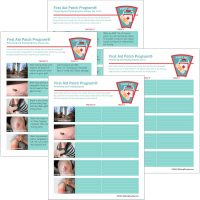 Before you go hiking:
Before you go hiking:
- Watch this video to learn how to wrap a sprained ankle.
Pair up with a troop mate and practice wrapping each other’s ankles. - Download and print the worksheets about prevention and treatment of injuries and illness while hiking from your order confirmation. Learn about common injuries when hiking. How can they be prevented? Do you know how to treat them? In the spaces provided list tips to prevent the injury/illness and how you would treat it.
When you go hiking:
- Use your knowledge about hiking safety to prevent injuries.
- When the hike is over, discuss what your troop could have done better to stay safe during the hike.
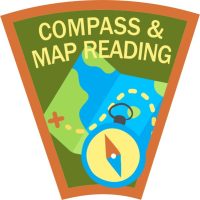
Suggestions for how younger kids can earn the Compass & Map Reading Patch.
Before you go hiking:
- If you have internet access, get familiar with a park map such as this interactive map from Reading PA. If not, get a map from your local park and familiarize yourself with the parts of a map.
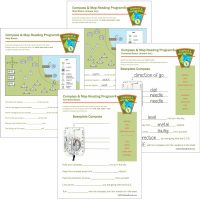
- Print the download attached to your order confirmation about map basics. Locate the compass rose on the map. Locate the key on the map. Complete each of the sentences with north, east, south or west using the compass rose and the key.
- If you have internet access watch the video below about the parts of a compass. Print the download attached to your order confirmation. Use the information you’ve learned to fill in the blanks.
When you go hiking:
- Find your starting location on the park map. Find your planned trail on the map. What direction will you be heading?
- Demonstrate you can use a compass to find your Direction of Go.
- During your hike, check the map and the compass. Find your location.
Suggestions for how older kids can earn the Compass & Map Reading Patch.
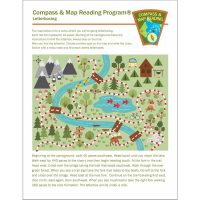 Before you go hiking:
Before you go hiking:
- Letterboxing is a “treasure hunt” style outdoor activity. Letterboxers hide small, weatherproof boxes in publicly-accessible places and post clues to finding the box online. Find out if there are any letterboxes in a nearby park.
- Print the letterboxing download attached to your order confirmation. The map is a pretend camp where you will be going letterboxing. Each red dot represents 10 paces. Starting at the campground follow the instructions to find the letterbox. Always stay on the trail.
After you find the letterbox, choose another spot on the map and write the clues on another piece of paper. Switch with a troop mate and find each others letterboxes. - Find out about geocaching.
- Find out about orienteering.
- Decide if you want to participate in any of the above activities. If so, use the online resources to prepare.
When you go hiking:
- If you chose one of the navigation games, complete your goal. If not, use a park map and a compass to track your hike.
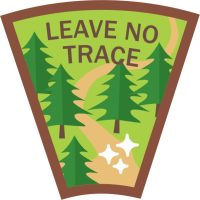
There are Seven Principles of Leave No Trace — also known as LNT. These principles provide an easily understood framework for minimizing the impact when you visit the outdoors:
- Plan Ahead & Prepare
- Travel & Camp on Durable Surfaces
- Dispose of Waste Properly
- Leave What You Find
- Minimize Campfire Impacts
- Respect Wildlife
- Be Considerate of Others
Suggestions for how younger kids can earn the Leave No Trace Patch.
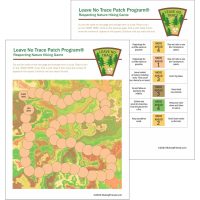 Before you go hiking:
Before you go hiking:
- Download and print the LNT game from your order confirmation. Cut out the cards and arrange them in a pile. Place a coin on the “START HERE” circle. Pick a card. Read it then move the number of spaces on the square. Continue until you reach the end.
- Think about the things you need to do before your hike so you can leave no trace. Make a list and review it when packing for your hike.
- Apply the principles of LNT everywhere you go. Look around your meeting space before you leave. Make sure there is no trash or crumbs and that everything is put back to its original spot. Consider leaving the space better than you found it!
- Take the Leave No Trace pledge.
When you go hiking:
- Staple your Leave No Trace cards together at the colored square. Review them.
- While hiking place a check mark on any principle you were able to observe or compete in during your hike.
- After your hike, discuss with your group anything you could have done better.
Suggestions for how older kids can earn the Leave No Trace Patch.
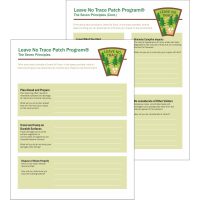 Before you go hiking:
Before you go hiking:
- Take the Leave No Trace Online Course.
- Download and print the worksheets about Leave No Trace from your order confirmation.
- Think about each principle of Leave No Trace. In the space provided, write at least one thing you can personally do minimize your impact on the environment.
- Take the Leave No Trace pledge.
When you go hiking:
- Review your Leave No Trace worksheets.
- While hiking place a check mark on any principle you were able to observe or compete in during your hike.
- After your hike, discuss with your group anything you could have done better.
It’s a wonderful and educational experience to watch wildlife. However, It’s important to do it responsibly. Here are guidelines:
Report wildlife that seems sick or abandoned.
Keep my pets home or on a leash.
Lend a hand with trash removal.
Suggestions for how younger kids can earn the Watching Wildlife Patch.
Before you go hiking:
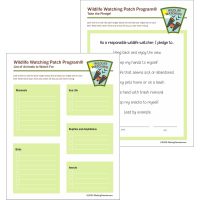 Print bird coloring pages from FreeKidsCrafts.com. Find out if any of these birds are native to your area.
Print bird coloring pages from FreeKidsCrafts.com. Find out if any of these birds are native to your area.- Look for birds in your backyard or park. Are any the birds on your coloring pages?
- Find out what kind of birds you can hope to see on your hike. You can look online or ask a park ranger.
- Find out what other kind of animals you might see. Will you be near a stream or other body of water? Will there be fish or other sea life? Don’t forget about insects! Fill in those animals on your Watching Wildlife Worksheet which you download from your order confirmation.
- Download and print the Watching Wildlife Pledge from your order confirmation. Sign and date or pledge online.
When you go hiking:
- If possible, bring binoculars to watch wildlife from a distance.
- If possible, bring a magnifying glass to view insects.
- Bring your checklist, a notepad and pencil. Check off any animals from your list that you are fortunate to view. Use your journal to record interesting behaviors and any additional wildlife you watched.
Suggestions for how older kids can earn the Watching Wildlife Patch.
Before you go hiking:
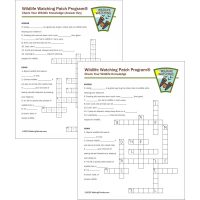 Find out what kind of birds you can hope to see on your hike. You can look online or ask a park ranger.
Find out what kind of birds you can hope to see on your hike. You can look online or ask a park ranger.- Find out what other kind of animals you might see. Will you be near a stream or other body of water? Will there be fish or other sea life? Don’t forget about insects! Fill in those animals on your Watching Wildlife Worksheet which you download from your order confirmation.
- Complete the Watching Wildlife crossword puzzle which you download from your order confirmation.
- Download and print the Watching Wildlife Pledge from your order confirmation. Sign and date or pledge online.
When you go hiking:
- If possible, bring binoculars to watch wildlife from a distance.
- If possible, bring a magnifying glass to view insects.
- Bring your checklist, a notepad and pencil. Check off any animals from your list that you are fortunate to view. Use your journal to record interesting behaviors and any additional wildlife you watched.
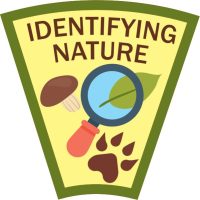 Suggestions for how younger kids can earn the Identifying Nature Patch.
Suggestions for how younger kids can earn the Identifying Nature Patch.
Before you go hiking:
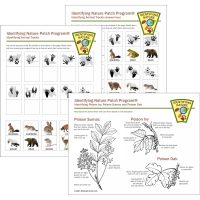 Download and print the worksheet about poison ivy, poison oak or poison summac from your order confirmation. Find out if your area has any of these plants. Use the worksheet to learn to identify them. Color the plants based on the descriptions given.
Download and print the worksheet about poison ivy, poison oak or poison summac from your order confirmation. Find out if your area has any of these plants. Use the worksheet to learn to identify them. Color the plants based on the descriptions given.- Download and print the worksheet about animals and their tracks from your order confirmation. Cut out the 10 images at the bottom of the page. Looking at the shapes of the animals match them to the photos of the animals. Glue in place. Save to use as a reference guide when you go hiking.
- Download and print the nature scavenger hunt from your order confirmation.
When you go hiking:
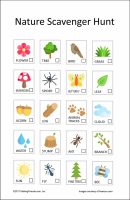 See how many of the items from the scavenger hunt you see while hiking.
See how many of the items from the scavenger hunt you see while hiking.- If you see any animal tracks use your worksheet to try to identify them.
- Watch for poison ivy, poison oak and poison summac. Do not touch but point it out to others with you.
Suggestions for how older kids can earn the Identifying Nature Patch.
Before you go hiking:
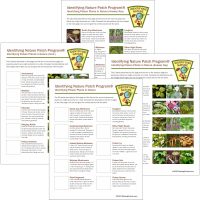 Download and print the worksheets about poisonous plants from your order confirmation. 15 poisonous plants you might encounter on a hike are described . Compare the descriptions with the images also provided. Cut out and glue the correct picture with the plant.
Download and print the worksheets about poisonous plants from your order confirmation. 15 poisonous plants you might encounter on a hike are described . Compare the descriptions with the images also provided. Cut out and glue the correct picture with the plant.- If possible, download an app that helps you identify animal tracks. Practice in your yard or a park or complete the animal tracks worksheet provided in your order confirmation.
- Download and print the tree identification scavenger hunt from your order confirmation.
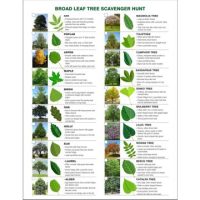 When you go hiking:
When you go hiking:
- See how many of the trees from the scavenger hunt you can identify while hiking.
- If you see any animal tracks use your app or worksheet to try to identify them.
- Watch for poison plants. Do not touch but point it out to others with you.

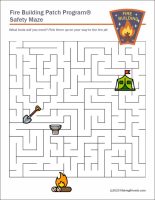
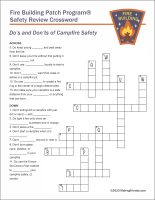
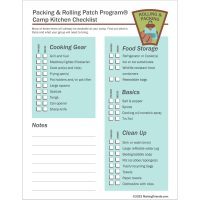
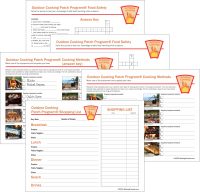
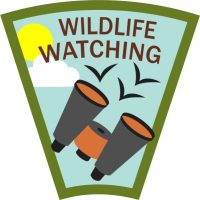 Hang back and enjoy the view.
Hang back and enjoy the view.